African health experts from 16 nations have gained cutting-edge skills in genome sequencing and pathogen detection through a three-week training program supported by BGI Group, marking a milestone in China-Africa public health cooperation. The workshop, held at the Africa Centers for Disease Control and Prevention (Africa CDC) headquarters, concluded today with a ceremony attended by dignitaries, highlighting BGI's pivotal role in empowering the continent's fight against infectious diseases.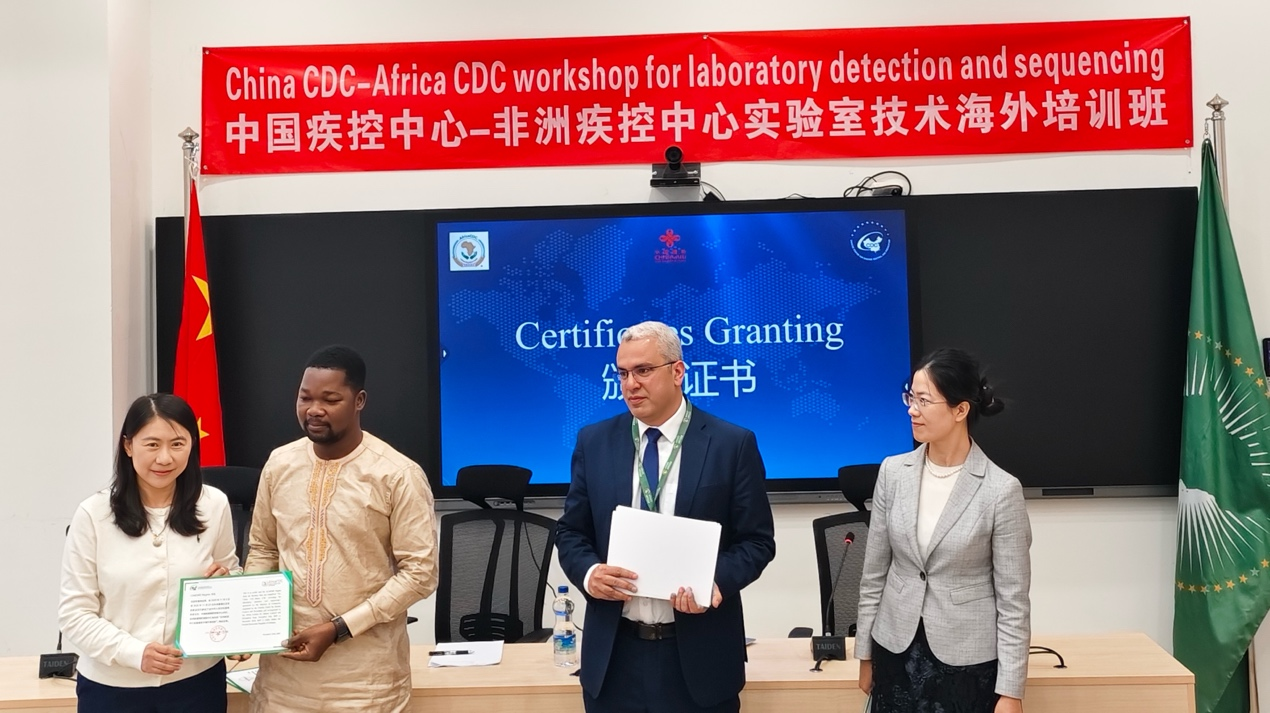
Dr. Wael H. Roshdy (second from right), Chief Scientist of Africa CDC's Laboratory, along with Dr. Yutao Du (first from left), Board member of BGI Group, and officials from the Chinese Mission to the African Union, awarding certificates to the graduates.
Hosted by the Chinese Center for Disease Control and Prevention (China CDC) and co-hosted by Africa CDC, the program provided intensive training to 30 technical professionals in advanced laboratory techniques, including high-throughput sequencing, biosafety management, and drug-resistance monitoring.
Six BGI technical experts led hands-on sessions, introducing innovative technologies like DNA nanoball sequencing and automated cyclone sequencing machines. These tools are set to enhance real-time disease surveillance and response capabilities across Africa, addressing challenges such as antimicrobial resistance (AMR) and outbreak containment.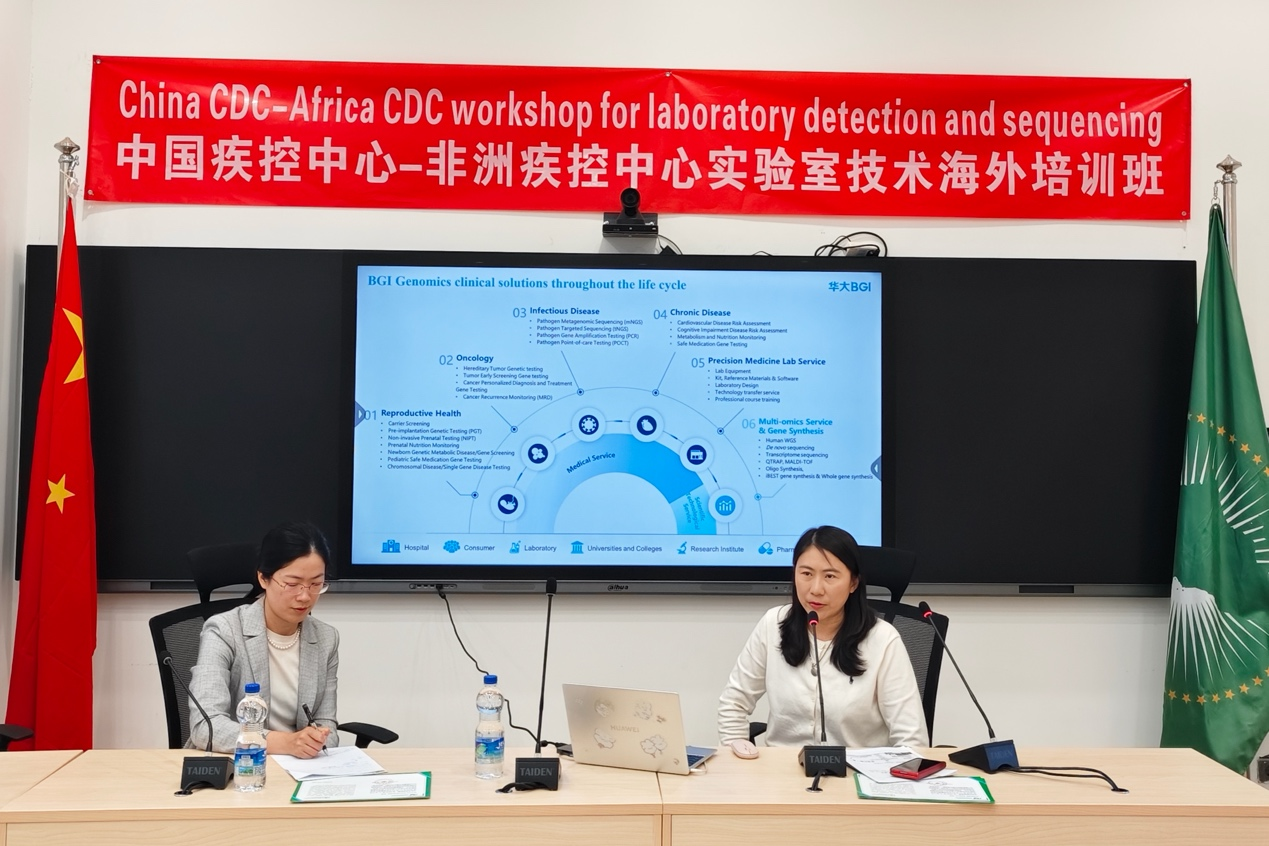
Dr. Yutao Du (right), Board member of BGI Group, speaks at the closing ceremony.
The closing ceremony featured Dr. Wael H. Roshdy, Chief Scientist of Africa CDC's Laboratory, along with officials from the Chinese Mission to the African Union, who awarded certificates to the graduates. Dr. Yutao Du, Board member of BGI Group, underscored the company's commitment: "BGI has actively participated in global public health undertakings and is willing to support the capacity building of the Africa CDC and the development of public health in the African continent," she stated.
Participants praised the training's practical impact. Kone Klima Marcel, a microbiologist from Mali's National Institute of Public Health, called it a "great opportunity" to learn Chinese DNA sequencing technologies. "I discovered that they (the Chinese) have great technologies like the DNA nanoball sequencing and also the cyclone sequencing machine, and those are some of the technologies that will really help us in Africa enhance DNA sequencing," Marcel said. He highlighted how automated systems could enable near real-time pathogen detection in minutes, reducing manual labor and accelerating outbreak responses in resource-limited environments.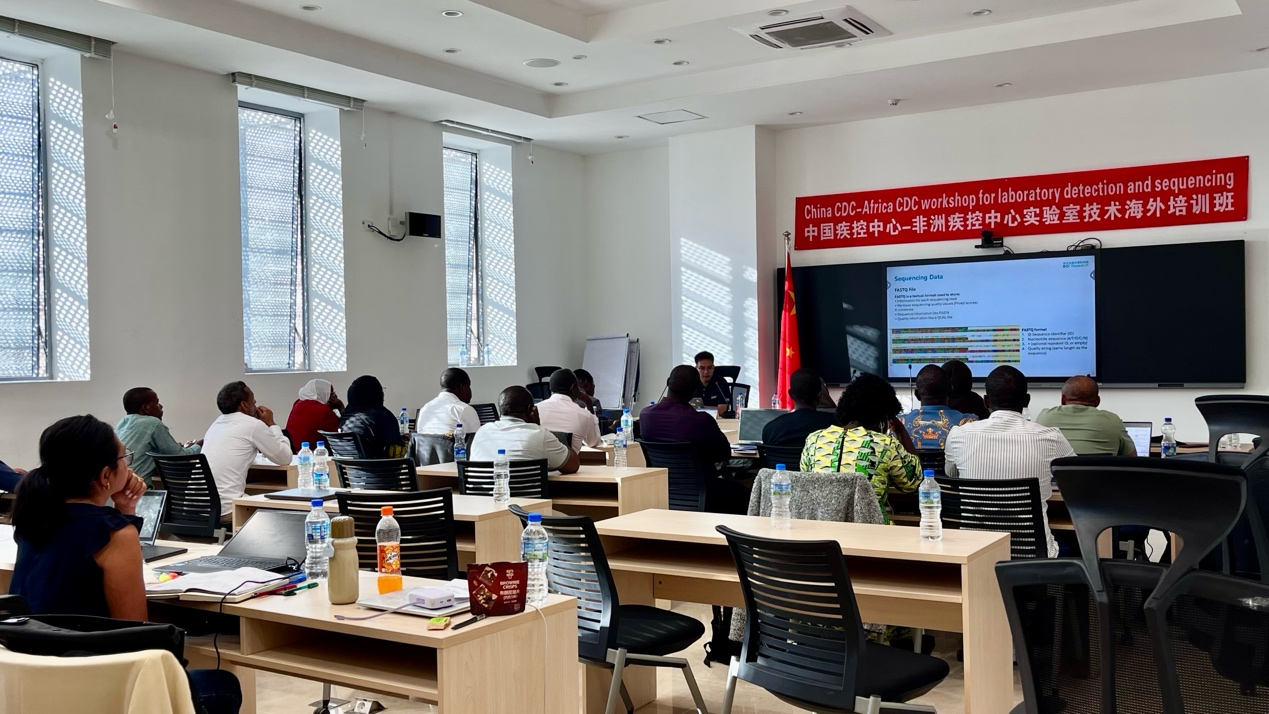
BGI Group lecturer gives a lecture on DNA sequencing to the participants.
Precious Simushi, a biomedical scientist from the Zambia National Public Health Institute, was drawn to sessions on phage therapy as a solution to rising AMR. "In an era where there is an increase in antimicrobial resistance, phage therapy has come in very handy. We have been taught how to use other means than the usual antibiotics to handle these antimicrobial resistances through phage therapy," Simushi explained. She noted that BGI's automated extraction technologies allow bacteriophage isolation in under 20 minutes, facilitating quicker interventions. "Having this technology in hand will mean that we'll be able to actually detect and respond quickly and be able to contain any outbreak that comes our way," she affirmed.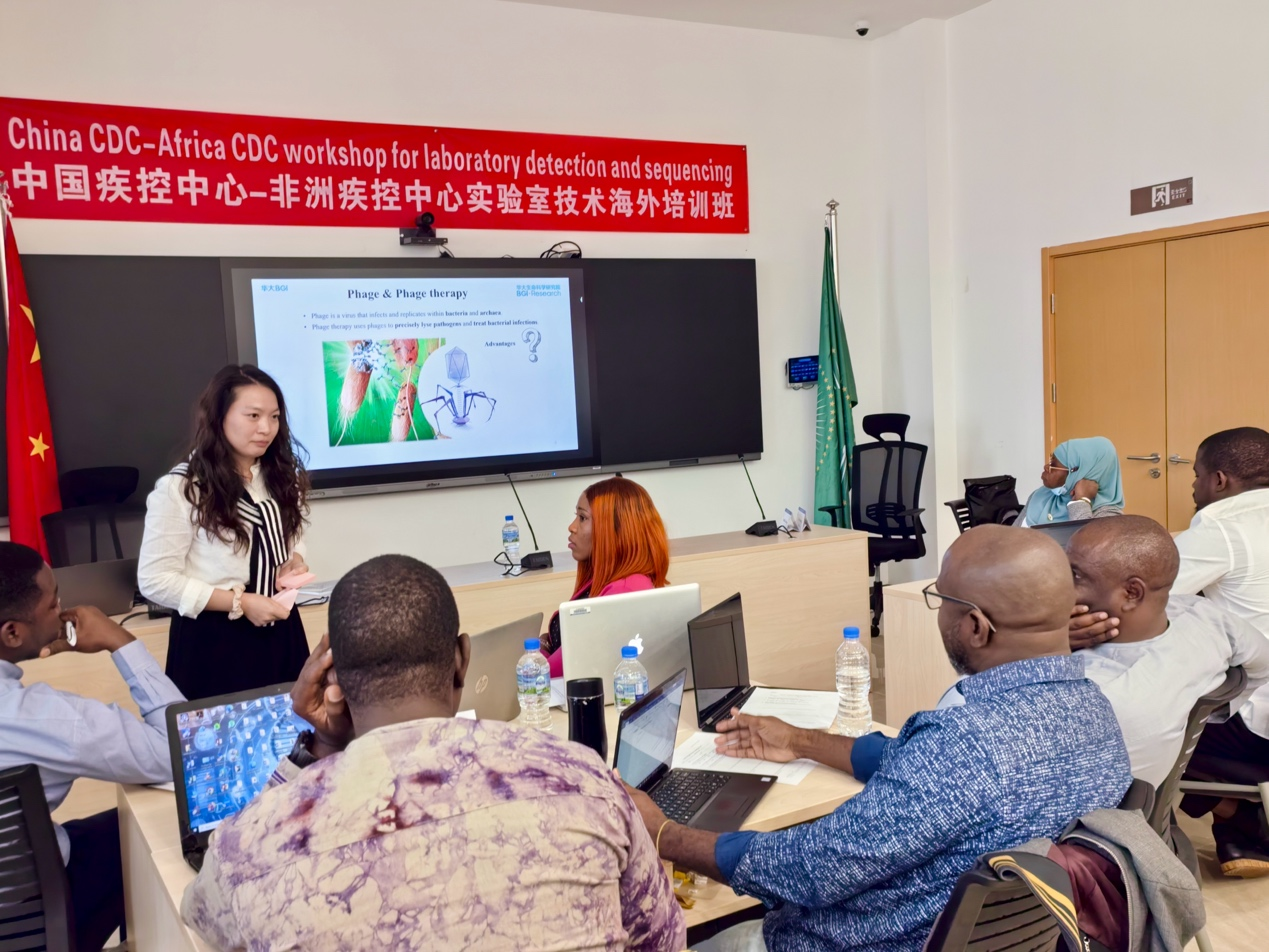
BGI Group lecturer interacts with the participants.
Idrissa Laybohr Kamara, a doctor from Sierra Leone with master's and PhD degrees from China, discovered phage therapy for the first time. Amid the surge in drug-resistant diseases like tuberculosis, he emphasized its value: "In fact, this is the first time I've heard of phage therapy, which is a new technology and a treatment. It is very important that it can solve the problem of antibiotic resistance in Africa," Kamara said.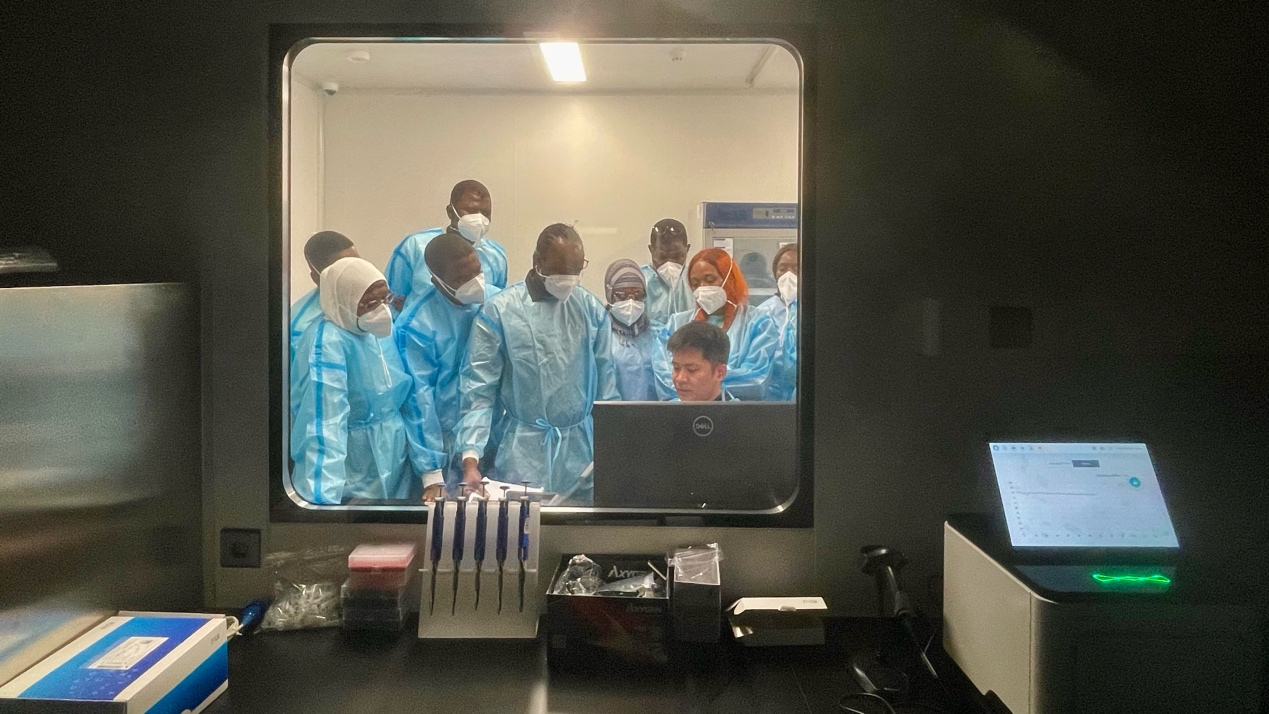
BGI Group technician provides hands-on laboratory technique training to participants.
BGI Group lecturer and researcher Dr. Liu Wenfeng detailed the shared innovations: "We have brought several advanced technologies, including DNA sequencing and antibiotic treatment that will help African health professionals deal with drug-resistant disease." The curriculum also emphasized standardized laboratory quality management, ensuring participants can apply these skills effectively back home.
BGI Group's involvement extends a legacy of African support. In 2014, BGI decoded the Ebola virus genome, provided a high-throughput sequencer to a Chinese-aided biosafety lab in Sierra Leone, and provided technical training to combat the West African outbreak. Starting in 2020, BGI established "Huo-Yan" laboratories in Ethiopia, Tanzania, Angola, Togo, and Ghana, and built a COVID-19 testing reagent factory in Ethiopia to aid pandemic response. In November 2024, BGI experts assisted Rwanda with Marburg virus traceability.
As emerging diseases and AMR pose growing threats, BGI Group's genomics expertise positions it as a vital ally for Africa. By disseminating advanced sequencing and phage therapy knowledge, BGI is fostering resilient health systems for rapid, effective action. This program advances BGI's mission of equitable biotechnology access, ensuring Africa stands strong against health challenges.
Source: https://english.news.cn/20251122/1d3e4de91d274cb989492aefb8229ed5/c.html



